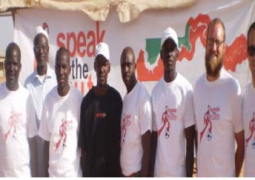
Newly-appointed chief prosecutor of the International Criminal Court, Fatou Bom Bensouda, has given her first interview to Gambian journalists since her appointment, focusing on a wide range of issues ranging from the roles of the ICC to its challenges and the situation in Libya.
Gambian-born Bensouda, 50, was appointed as the new prosecutor of the ICC, replacing tough-talking Moreno Ocampo and becoming the first African to hold the top post at the ICC.
In an interview with journalists at the Kairaba Beach Hotel yesterday, Bensouda said the fact that she has been deputy prosecutor of the ICC for the past seven years afforded her the opportunity to really know where they are doing things very well, what areas they need to improve upon and what areas they need to discard, may be completely.
“I think this opportunity that I have had is what I believe is preparing me also to look ahead,” she added.
According to her, there are many challenges facing the ICC within the international justice system. But, as she put it, “having had the experience, I think I am now in a position to tackle those challenges that lie ahead.”
International justice, she said, is especially concentrating on the ICC; we are operating in areas of ongoing conflicts most of the time; when we indict someone, we obviously have to talk to witnesses or to receive documents.
“So the issue of protection of witnesses is a big thing for us, because you need to talk to these people without exposing them and also, as ICC, we have obligations at all levels to ensure that these witnesses are fully protected; you cannot expose them,” she said, adding further that this is one major challenge that the ICC faces.
Another major challenge, she continued, is even arresting the people that the ICC indicts as this is a big problem that the court faces because it is without a police force or an army.
Noting that it is the states which have signed and ratified the Rome Statute who have the obligation to arrest those people and surrender them to the ICC, Bensouda said it is always not convenient for those countries, for one reason or another, to arrest those individuals.
This, she went on, remains a challenge because, before a trial can take place, a body has to be before the ICC.
On whether the ICC expects Saif-al-Islam, son of killed Libyan leader Maummar Gaddafi, to get a fair trial in Libya, the ICC prosecutor said the court has to wait and see whether Saif-al-Islam will receive a fair trial or not.
“The ICC office of the prosecutor has decided to observe what is taking place, but we definitely cannot say by any means you have to give us Saif-al-Islam. These issues have been raised and the fact that his father was executed on the part of the Libyans; obviously they are saying that this is not being repeated in the case of Saif-al-Islam, and what they intend to do is to bring him to justice; so that is a first step,” she explained.
She further told journalists that the ICC cannot move in on
“That is when we take the next step, but right now if this country says that we will do it, we have to stay and see what happens,” she stated.
This, she noted, is a system of complementarity; a system that those who have signed and ratified the Rome Statute have put in place, which means that ICCs intervention is a last resort, and not the first thing.
Bensouda also explained that when there is a crime in any country, ICC will only step in if that country is saying ‘I am unable to or unwilling’, but if they come up and say that ‘I am going to try this person’, ICC will have to wait; this is the system.
“So we cannot force
The ICC, she added, will wait for the challenge, because now Libyans will have to challenge the jurisdiction of the ICC, the admissibility of the case and this means that ‘we are doing it, so you cannot do it or we will do it’. This, she stated, is the first step, and not the last.
Bensouda also explained that the ICC is a voluntary organization, and that countries have not been forced to sign and ratify the Rome Statute; they are entering into this signing and ratifying the Rome Statute voluntarily, with their eyes open.
“So once you sign and you ratify, you are saying that I accept the jurisdiction of the ICC in my country. This is a legal obligation that arises as a result of that action you take by signing and ratifying,” she added.
“When the UN Security Council decides to ask the ICC’s intervention in certain countries, then we also have the jurisdiction by asking them to investigate this problem. They have done that in
Concluding, the ICC prosecutor stated that all governments, including the
People, she said, misunderstand the jurisdiction of the ICC and human rights.
“We are not a human rights court as such; we are a court that has been set up to deal with genocide, war crimes and crimes against humanity,” she added.



